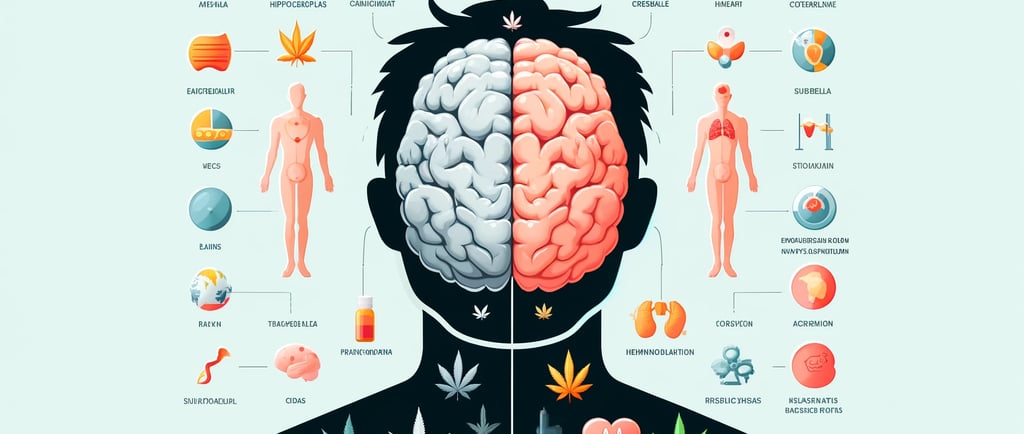How Marijuana Affects the Brain & Body
Understanding Marijuana
HEALTH


How Marijuana Affects the Brain & Body
Marijuana, also known as cannabis, is one of the most widely used substances around the world. As its legality continues to evolve, understanding how marijuana affects the brain and body has become increasingly important. This article explores the short-term and long-term effects of marijuana use, shedding light on its impact on cognitive function, physical health, and overall well-being.
Understanding Marijuana
Marijuana is derived from the Cannabis plant, which contains over 100 active compounds known as cannabinoids. The two most studied cannabinoids are tetrahydrocannabinol (THC) and cannabidiol (CBD):
THC: The primary psychoactive component of marijuana that produces the "high" associated with its use.
CBD: A non-psychoactive compound known for its potential therapeutic benefits, including anti-inflammatory, analgesic, and anti-anxiety properties.
Short-Term Effects on the Brain
When marijuana is consumed, THC rapidly passes from the lungs into the bloodstream and travels to the brain, where it binds to cannabinoid receptors. This interaction leads to several short-term effects:
Euphoria: Often described as a "high," users may feel a sense of well-being and happiness.
Altered Perception: Marijuana can distort the perception of time, space, and sensory experiences.
Impaired Memory: Short-term memory and the ability to form new memories can be affected.
Reduced Coordination: Motor skills and coordination may be impaired, increasing the risk of accidents.
Increased Appetite: Commonly known as the "munchies," users may experience heightened hunger.
Long-Term Effects on the Brain
Regular and prolonged use of marijuana can lead to several long-term changes in the brain:
Cognitive Decline: Chronic use, especially starting in adolescence, is linked to impairments in attention, memory, and learning.
Addiction: Approximately 9% of users may develop a marijuana use disorder, characterized by dependence and withdrawal symptoms.
Mental Health Issues: Long-term use is associated with an increased risk of anxiety, depression, and in some cases, psychosis, particularly in individuals predisposed to mental health disorders.
Altered Brain Structure: Some studies suggest that chronic use may lead to changes in brain regions involved in motivation, reward, and emotional regulation.
Short-Term Effects on the Body
Marijuana affects various physiological systems, leading to several short-term physical effects:
Increased Heart Rate: THC can cause a temporary increase in heart rate, which can be risky for individuals with heart conditions.
Dry Mouth and Red Eyes: Users often experience dryness in the mouth and bloodshot eyes due to changes in blood flow.
Impaired Reaction Time: Slower reaction times can affect activities that require quick responses, such as driving.
Temporary Immune Suppression: Short-term use may weaken the immune response, making the body more susceptible to infections.
Long-Term Effects on the Body
Long-term marijuana use can have several lasting effects on physical health:
Respiratory Issues: Smoking marijuana can lead to chronic bronchitis and other respiratory problems. However, these risks are lower than those associated with tobacco smoking.
Cardiovascular Problems: Long-term use may increase the risk of cardiovascular diseases, particularly in individuals with pre-existing conditions.
Reproductive Health: Chronic use can affect reproductive health, including reduced sperm count in men and disrupted menstrual cycles in women.
Compromised Immune System: Prolonged use may weaken the immune system, potentially leading to more frequent infections.
Therapeutic Benefits of Marijuana
Despite its potential risks, marijuana also has several recognized therapeutic benefits, primarily due to its cannabinoids:
Pain Relief: THC and CBD can alleviate chronic pain, making marijuana a valuable option for patients with conditions like arthritis and fibromyalgia.
Nausea and Vomiting: Marijuana is effective in reducing nausea and vomiting, particularly in cancer patients undergoing chemotherapy.
Appetite Stimulation: It can help increase appetite in patients with conditions like HIV/AIDS or those undergoing cancer treatments.
Neurological Disorders: CBD is being studied for its potential in treating neurological disorders like epilepsy and multiple sclerosis due to its neuroprotective properties.
Conclusion
Marijuana's effects on the brain and body are complex and multifaceted. While it offers potential therapeutic benefits, particularly in pain management and treatment of certain medical conditions, it also poses risks, especially with long-term use. Understanding these effects is crucial for making informed decisions about marijuana use. As research continues to evolve, it is essential to stay informed about the latest findings to balance the benefits and risks effectively.
At Sunshare Academy, we are committed to providing comprehensive information to help you navigate the complexities of health and well-being. Explore our resources to learn more about marijuana and other important health topics.



